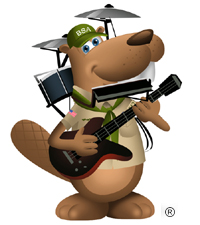Music


Resources
- Music Class Preparation Page
- Music Workbook
- Scoutmaster Bucky's Merit Badge Advancement Quick Reference
- Scoutmaster Bucky's Acknowledgement Form
Music Requirements Current Scouts BSA requirements
as of April 28, 2025
as of April 28, 2025
1.
Sing or play a simple song or hymn chosen by your counselor, using good
technique, phrasing, tone, rhythm, and dynamics. Read all the signs and
terms of the score.
2.
Name the five general groups of musical instruments. Create an illustration
that shows how tones are generated and how instruments produce sound.
3.
Do TWO of the following:
a.
Attend a live performance, or listen to three hours of recordings from
any two of the following musical styles: blues, jazz, classical,
country, bluegrass, ethnic, gospel, musical theater, opera. Describe
the sound of the music and the instruments used. Identify the composers
or songwriters, the performers, and the titles of the pieces you heard.
If it was a live performance, describe the setting and the reaction of
the audience. Discuss your thoughts about the music.
b.
Interview an adult member of your family about music. Find out what the
most popular music was when he or she was your age. Find out what his
or her favorite music is now, and listen to three of your relative's
favorite tunes with him or her. How do those favorites sound to you?
Had you ever heard any of them? Play three of your favorite songs for
your relative, and explain why you like these songs. Ask what he or she
thinks of your favorite music.
c.
Serve for six months as a member of a school band, choir, or other
organized musical group, or perform as a soloist in public six times.
d.
List five people who are important in the history of American music and
explain to your counselor why they continue to be influential. Include
at least one composer, one performer, one innovator, and one person
born more than 100 years ago.
4.
Do ONE of the following:
a.
Teach three songs to a group of people. Lead them in singing the songs,
using proper hand motions.
b.
Compose and write the score for a piece of music of 12 measures or
more, and play this music on an instrument.
c.
Make a traditional instrument and learn to play it.
5.
Define for your counselor intellectual property (IP). Explain how to
properly obtain and share recorded music.

